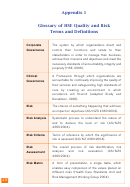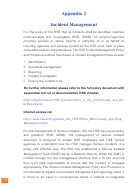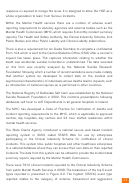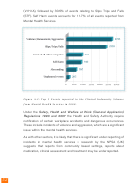Risk Management In Mental Health Services Page 34
ADVERTISEMENT
CHAPTER 4
4.1 Good Practice and Key Clinical Risks
Risk management is an essential part of a good clinical practice. This
chapter provides practical guidance on communication, personal safety
and staff training and addresses some of the key clinical risks in mental
health practice such as vulnerability, suicide and violence. Key points from
Linking Safety and Service (HSE, 2008; the
Although risk will
strategy
for
managing
work
related
aggression and violence within the Irish
never be eliminated
health service) are included in this chapter
completely, it can
and it is recommended that the strategy
should be read in conjunction with this section.
be minimised by ….
4.2 Good Practice
Although risk will never be eliminated completely, it can be minimised by
ensuring that there is good communication, sufficient attention to staff
and patient safety and appropriate training and support for staff and
service users. These three issues are dealt with in more detail below. A list
of Best Practice Principles is included (see Table 4.1).
4.2.1
Communication
Good communication is key to managing risk. All methods of
communication are important to achieve effective risk management in care
provision. Research and clinical practice have indicated that specific aspects
of communication are important in order to achieve this, these include:
Listening to all concerned:
full and clear picture is essential (rapport is a
crucial element and time is required to build up a relationship of trust and
respect).
Asking the questions:
the quality of the assessment is dependent on
asking appropriate questions.
33
ADVERTISEMENT
0 votes
Related Articles
Related forms
Related Categories
Parent category: Business
 1
1 2
2 3
3 4
4 5
5 6
6 7
7 8
8 9
9 10
10 11
11 12
12 13
13 14
14 15
15 16
16 17
17 18
18 19
19 20
20 21
21 22
22 23
23 24
24 25
25 26
26 27
27 28
28 29
29 30
30 31
31 32
32 33
33 34
34 35
35 36
36 37
37 38
38 39
39 40
40 41
41 42
42 43
43 44
44 45
45 46
46 47
47 48
48 49
49 50
50 51
51 52
52 53
53 54
54








